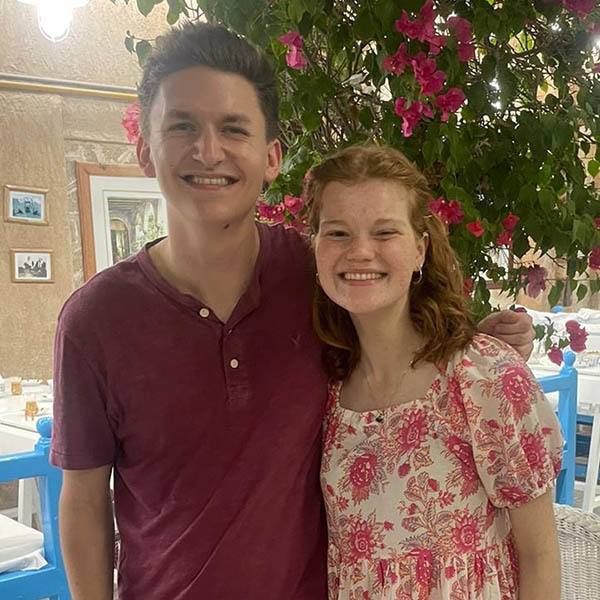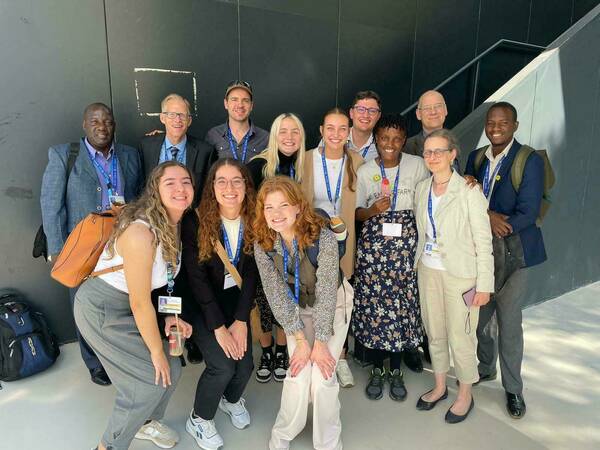
Linnea Barron ’26 is a biological sciences and peace studies double major with minors in scientific computing and the Glynn Family Honors Program. During the fall of 2023, she traveled to Dubai, United Arab Emirates, to attend the COP28 conference with assistance from the Glynn Program and the Nanovic Institute for European Studies. Also making the journey with support from the Liu Institute for Asia & Asian Studies was Garrett Pacholl ’24, a history and global affairs double major who is also part of the Glynn Family Honors Program. Together they bring their reflections on the conference, diplomacy, and what comes next.
“When the heat gets high, and the floods roll in, and the people rise, let them hear us sing, it's the end of fossil fuels.”
This is the song we chanted with other protestors outside the main negotiation hall at the annual United Nations Climate Conference COP28 in Dubai. After a draft text containing vague and weak language on fossil fuels was published just hours before the conference was set to end, those of us who were frustrated with the nature of diplomacy at the conference rallied to hold the “red line,” a text that contained a complete phase-out of fossil fuels. Shouting, screaming, and singing outside of the room where negotiations were occurring was a powerful image. It was an impassioned display of activism to the point that officials of the host conference told us that we were being “too loud.”

Yet clearly, we were not being loud enough, as the final text published the next day contained stronger, yet still inadequate wording on fossil fuels. The official text “calls on Parties to contribute” to various mitigation measures including “transitioning away from fossil fuels in energy systems, in a just, orderly and equitable manner, accelerating action in this critical decade, so as to achieve net zero by 2050 in keeping with the science.”
Calls on. Contribute. Transitioning away. Language that felt sterile, surgical, belying the growing urgency of the crisis these measures were meant to address.
No “all-nighters” in climate change
It felt like we were watching humanity working on a global group project whose grade would determine the fate of our entire species. Scientists provided the grading scales and the benchmarks, such as keeping global warming under 1.5°C from pre-industrial levels and reaching net-zero emissions by 2050. And like a typical group project, we watched policymakers from around the world take minimal, incremental steps—measures that are wildly insufficient to reach these important targets—as these looming dates rapidly approached, feebly attempting to soothe us with unsubstantiated promises that these problems could be solved at the last minute. We watched country representatives, particularly those from states with historically high emissions rates, deflect blame for their inaction and promise everyone that they are just doing their best.
We may not live in an ideal world with ideal solutions already in place, but that just means that we have space to push for more comprehensive solutions. We do have power, however large the problem may seem, and the first-ever explicitly codified language calling for a transition away from fossil fuels is another tool for us to use.
There are a couple of things wrong with this “group project” metaphor. One, focusing solely on deadlines ignores the fact that the climate crisis is right here, right now. Global procrastination has direct implications for people’s lives and livelihoods today, not just in 25 years. We saw this truth etched in the determination of negotiators from Pacific island nations, whose resolve stemmed in large part from the knowledge that climate inaction meant that their homes would soon be permanently swallowed up by rising sea levels. We saw this truth radiating from the righteous anger of civil society actors, recounting the names of environmental defenders whose “heinous crimes” were protesting for the integrity of their lands.
Second, and perhaps most importantly, the standard group project experience usually involves what might charitably be called “doing everything at the last minute.” But it’s impossible to solve the climate crisis with this hope in mind. No all-nighter will put all the pieces back into place—there is too much to do, and a lot of these steps require significant time and effort to accomplish. Inaction now leads to tipping points, be they in 2050 or much, much sooner, from which there is no coming back. It’s now or never.
Disappointment, but also hope, in diplomacy

As former members of the Nanovic Institute’s Diplomacy Scholars Program, centered on experiencing and understanding diplomacy in theory and practice for our future professional lives, we were interested in attending COP28 to witness a real diplomatic event firsthand. Our experiences made us wary of diplomacy. To us, diplomacy was failing humanity. The decisions made in high-level negotiations had life-or-death implications for many countries facing the worst effects of climate change. Losing sight of the 1.5℃ warming target would mean displacement and incalculable damage to those living in small island states and so many others. It will mean lives lost due to flooding, hurricanes, and wildfires. We met many individuals from the most affected countries, including the Marshall Islands, Fiji, and Palau, who were incredibly inspiring, kind, and passionate people. We found ourselves angry at diplomacy, at the unfairness of countries like Saudi Arabia and other OPEC countries holding up negotiations when people’s lives were on the line. Even creative forms of diplomacy, like the Presidential Majlis held by COP President Sultan Al Jaber, an informal and open conversation based on the Arab tradition, did not produce positive outcomes.
Our experiences at COP28 certainly showed us the limitations of traditional diplomacy. In the face of an ever-growing crisis that requires tackling powerful vested interests with significant monetary and political influence, as well as vast structural issues, the immense time spent on nebulously worded outcomes and vague promises seems far too ineffective to put forth the necessary solutions to our survival. However, diplomacy is not merely confined to negotiations. It’s a mindset. Thinking back on our experiences as Diplomacy Scholars and in our work, we remember one of the foundational lessons of diplomacy—to use what you are given to push for the best outcome possible. We may not live in an ideal world with ideal solutions already in place, but that just means that we have space to push for more comprehensive solutions. We do have power, however large the problem may seem, and the first-ever explicitly codified language calling for a transition away from fossil fuels is another tool for us to use.

While it seems traditional diplomacy may be failing us, there is still hope. The final text did not provide much of a framework for inherent change, but it provides an avenue to push for concrete action on climate change. As youth, we have a large role to play in climate diplomacy. We do not have to tolerate inaction in high-level negotiations. It is essential that we push for actual transitions away from fossil fuels in our countries. We can even start being climate activists in our own communities, raising this conversation to greater prominence on our campus and supporting measures like University divestment, which has not been accepted on an institutional level. We hope, as well, that more students from Notre Dame can attend future COPs and contribute their voices to these important conversations—using what they are given to push for the best outcome possible.
While diplomacy as we typically think of it may have offered disappointment for those who care about the climate crisis, we do not have to accept defeat. We can use the tools we have to make meaningful change in our own positions and in our own home communities.
Originally published by at nanovicnavigator.nd.edu on February 21, 2024.